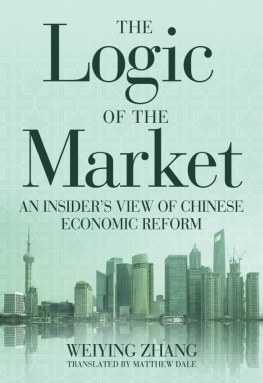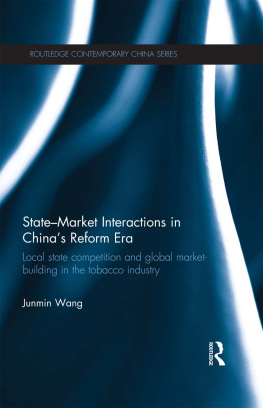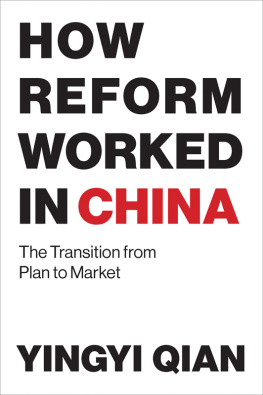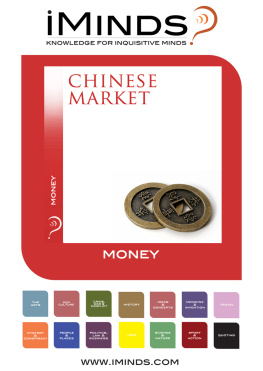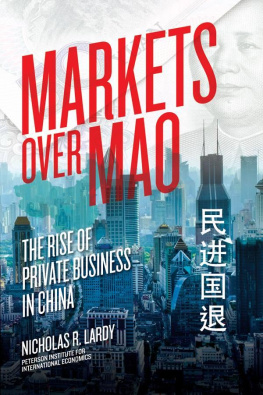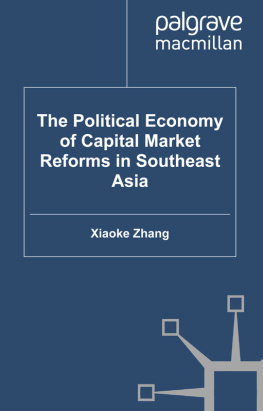
Contents
Tables
Figures
Chinas economic reforms that started in 1978 have had a tremendous impact on China, and even the world. On the one hand, after 30 years of high-speed economic growth, the living standards of the average person have greatly improved. There are more choices and more liberties. The international ranking of the Chinese economy has increased from 13th place before the reforms to 2nd place today. China has a greater voice in the international community. G2 has become part of the international vocabulary. There is even talk of the eastern transition of global leadership. On the other hand, with that high-speed economic growth, the various contradictions of Chinese society have become more prominent. Issues such as income inequality, regional differences, serious corruption in officialdom, health and education inequality, and environmental pollution have caused peoples feelings of dissatisfaction to increase instead of decrease along with the improvements in living standards.
Corresponding with these two phenomena are two groups with two ways of thinking about how to evaluate reforms of the past and guide reforms of the future that have arisen. I disagree with both. The first group, the China Model Theorists, believe that the source of the Chinese economic miracle was the unique China Model. Its basic characteristics are strong government intervention and a dominant state-owned economic sector. It is completely different from the road taken by Anglo-American and other Western countries. It is different from the free competition and private enterprise system advocated by the Washington Consensus. The second group, the Reform Failure Theorists, believe that Chinas current social contradictions are caused by marketization. They believe that 30 years of marketization reform policies were a mistake.
The China Model Theory was originally proposed by overseas scholars who researched developing countries (including China). After the 2008 Global Financial Crisis, certain Chinese scholars, and especially government officials, put faith in the idea. The Reform Failure Theory is mainly advocated by certain leftist Chinese scholars but has a significant following among ordinary people, and has even been acknowledged by certain high-ranking government officials.
In my view, these two ways of thinking, although they may appear different at first glance, are in essence the same. Both have blind faith in government power and distrust the logic of the market, have blind faith in the foresight of government officials but distrust the judgments of entrepreneurs, have blind faith in authority but distrust liberty, and have blind faith in national conditions and characteristics but do not accept universal values. The difference between the two is that the Reform Failure Theorists negate the market reforms of the past as a starting point to advocate returning to the era of central planning, government allocation of resources and incomes, eradication of private entrepreneurs, and state-owned enterprise dominance of the economy. To this they add a little abstract direct democratic participation from the masses. The China Model Theorists negate the marketization and democratic reforms of the future. They advocate solidifying the current system and power structure, relying on industrial policy to guide development, and using state-owned enterprises to guide the economy. As to whether their advocacy is based on principles or private interests, I do not know, but it is probably both.
On the surface, both of these ways of thinking have a certain basis in reality, but their understanding of reality is incorrect. Yes, if we compare China to Anglo-American developed countries, the biggest difference is that the Chinese government does intervene in economic and social affairs more, the proportion of state-owned enterprises is higher, and China has not established true democracy and rule of law. However, if because of this we attribute the past 30 years of Chinas economic growth to government intervention and state-owned enterprises, as the China Model Theory advocates do, we are wrong. Chinas reforms started with an all-powerful government under the planned economy. The reason China could have sustained economic growth during the process of reform was because the government managed less and the proportion of state-owned enterprises decreased, not the other way around. It was precisely the relaxation of government control that brought about market prices, sole proprietorships, town and village enterprises, private enterprises, foreign enterprises, and other non-state-owned entities. Not only did the Chinese economy not collapse, in fact it maintained a relatively high rate of growth. It should also be pointed out that the past 30 years of Chinas economic growth relied on technology and management practices that had accumulated in Western developed countries over the last few hundred years. These technologies and management practices could not possibly have been created by Chinas high levels of government intervention and economy dominated by the state-owned sector.
High levels of government intervention and state-owned enterprise dominance are not the reasons for the Chinese economic miracle. In fact, those things are the reason for the contradictions and unfairness in Chinese society that the Reform Failure Theorists exaggerate. Government control over large amounts of resources and excessive intervention into the economy are the direct cause of cronyism between officials and businessmen, are a breeding ground for official corruption, seriously corrupt commercial culture, and damage the markets rules of the game. The monopoly profits extracted by monopolistic state-owned enterprises allow state-sector employment compensation to far exceed fair market levels. It is an important contributor to income distribution inequality. If China opened up the medical market earlier, allowing nongovernment capital to freely enter instead of maintaining the monopoly status of state-owned hospitals, it would not be so difficult and expensive to see a doctor. If nongovernment schools could open freely, Chinas education quality would not be as poor as it is. If China could establish the absolute authority of the constitution and the law, putting government power below the law, there would not be as many cases of barbaric relocation as there are. If farmers truly held the right of land ownership, there would not be as many instances of unfair expropriation of farm land. If starting a business was the equal right of every person, instead of being a privilege bestowed on a group of people by government examinations and approvals, cronyism would not be as common as it is. If citizens had the right to vote and freedom of the press, government corruption would not be as unrestrained as it is today.
Unfortunately, during the 10-year reign of President Hu and Premier Wen, the China Model Theory and Reform Failure Theory were not limited to essays and catchphrasesthey were put into practice. This has seriously impacted the direction of government policy, causing reform to stagnate and even regress. Over the last 10 years, the pace of reform has been obstructed by anti-reform sentiments and policy. Some traditional methods of the planned economy have been resurrected under the name of macroeconomic adjustments and industrial policy. Prices that have been liberalized are now subject to price controls. Private advance and state retreat as the mainline of ownership structure adjustment has given way to state advance and private retreat. For many years, government revenues have far outpaced the growth of the national economy and residential incomes. Government investment has begun to squeeze out private capital. Entrepreneurial fervor to do business has been replaced by a zeal to emigrate. Countless other examples have created institutional deficits for future economic growth and caused Chinese society to be less harmonious.
Next page
